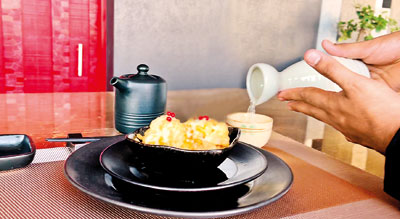Say ‘Kanpai’ at Tenku Japanese Restaurant
View(s): Kanpai is ‘cheers!’ in Japanese and what better way to say it than with a cup of Sake?Popular in Japan for over two thousand years, Nihonshu, known the world-over as Sake, is a Japanese alcohol made from polished rice. The premium grades of Sake, such as ginjo, however, have only been around for about 50 years.
Kanpai is ‘cheers!’ in Japanese and what better way to say it than with a cup of Sake?Popular in Japan for over two thousand years, Nihonshu, known the world-over as Sake, is a Japanese alcohol made from polished rice. The premium grades of Sake, such as ginjo, however, have only been around for about 50 years.
The polishing grade is an important element of Sake, with the three main grades being Junmai, Junmai Ginjo and Junmai Daiginjo.
Sake is an integral part of Japanese culture. In Japanese weddings, the groom and bride drink sake three times each, from three different-sized sake cups called sakazuki –symbolically exchanging their marriage vows. Sealing the bond between the two families, the parents too, take sips from the cups. Peering into ataru – a cedar wood barrel filled with Sake, and seeing a clear reflection of themselves in it, is also a practice and is believed to denote prosperity in the years to come.
Many years ago, Sake was sipped in Ochoko (Sake cups) that were made out of sea shells; today they are often fashioned out of clay and presented in Tokkuri, a special vessel that is ideal for keeping the Sake warm. Sake can be served cold, warm or at room temperature.
A couple of the myths about Sake are that is a very expensive alcohol (there is a wide range, at many price levels) and that it can only be paired with Sushi and Sashimi.
‘In the modern world, Sake can be paired easily with anything, as there are many varieties of it. It will pair easily with Domburi, Tepanyaki, Katsu Karei, Wagyu … the choices are truly endless and we offer some of the rarest Sakes at Tenku,’ said Kingsbury’s Beverage Service Manager,
Kusal Ashen.
Tenku has a Sake to satisfy every palate and also offers the most extensive list of Sake available in Colombo. Among the best Sakes to pair with your dinner include Tantakatan Shiso Shochu, an herb infused Sake with a fresh, floral aroma, and goes well as an aperitif with wasabi prawnsand dumplings. Urakasumi Kiippon is another, made from indigenous Japanese rice ‘Sasanishiki’ and has a hint of umami and creamy tones. The taste is similar to Chablis from France and goes well with Tofu, Yasai No Gomaae, and Lobster Teppanyaki. JosenMizuno GotoshiJunmaiGinjo, meanwhile, is a light and dry Sake that pairs well with Prawn Tempura. The smooth, versatile Sake is great with poultry and seafood.
One of the rarest Sakes that is available at Tenku is Furikaeru Jikan Junmai Daiginjo (Time
of Reflection), which has hints of white pear and mellow mango with a long finish; this
pairs beautifully with lightly spicy food.
At Tenku, Sake cocktails are also on offer; and are made incorporating traditional Japanese ingredients such as wasabi, pickled ginger, nori seaweed and soy sauce.
Head over to the rooftop restaurant to enjoy this unique culinary experience, along with the authentic menu curated by Chef Toshiyuki Okabe.
The Kingsbury Colombo adheres to stringent safety protocols, having received the ‘Safe and Secure Tourism’ Compliance Certificate from the Sri Lanka Tourism Development Authority.



